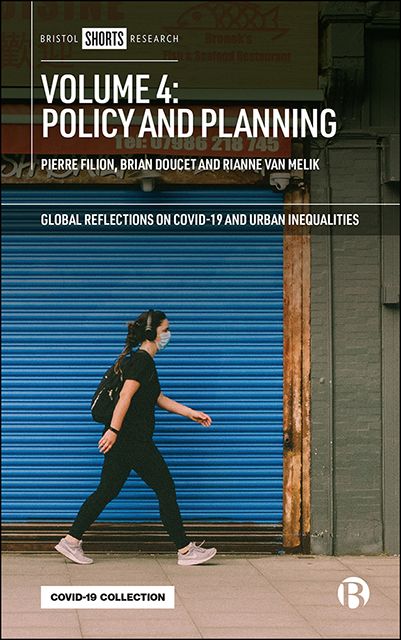Book contents
- Frontmatter
- Contents
- List of Figures and Tables
- Notes on Contributors
- Acknowledgments
- Preface to All Four Volumes of Global Reflections on COVID-19 and Urban Inequalities
- One Introduction: Policy Making in the Face of Uncertainty and Inequality
- Part I COVID-19 and Urban Changes
- Part II The Pandemic, Social Inequality, and Mobilization
- Part III Municipal and Urban Policy Responses
- Index
Thirteen - Rapid Deployment of Transport Infrastructure and Urban Social Injustice: The Case of MedellÃn, Colombia
Published online by Cambridge University Press: 25 April 2023
- Frontmatter
- Contents
- List of Figures and Tables
- Notes on Contributors
- Acknowledgments
- Preface to All Four Volumes of Global Reflections on COVID-19 and Urban Inequalities
- One Introduction: Policy Making in the Face of Uncertainty and Inequality
- Part I COVID-19 and Urban Changes
- Part II The Pandemic, Social Inequality, and Mobilization
- Part III Municipal and Urban Policy Responses
- Index
Summary
Introduction
Medellín has been widely touted as an example of effective urban transformation in the Global South (Castillo-Palacio et al, 2017; Franz, 2017). It is known for efforts that have led to a sharp reduction in violent crime and well-documented urban design innovations (Dávila et al, 2013). Notwithstanding these advances, Medellín continues to exhibit broad differences in spatial and social justice indicators across a north-south geographical divide, as captured by longitudinal data from Medellín Cómo Vamos, in which the comunas – the local administrative divisions – located in the northern urban districts, such as Popular or Castilla, have historically performed worse than those located in the south and west, such as Poblado or Laureles. The Multidimensional Life Quality Index results for the 2010–18 period illustrate that, in spite of a reduction in inequalities in some districts, important challenges still lie ahead for other districts (Medellín Cómo Vamos, 2019).
This chapter explores the geographical and socio-economic divide between two districts: Castilla, a predominantly lowermiddle class district located in the north, and Laureles, an upper-middle-class district located in the southwest. We focus our analysis on the limits that such divides impose on access to urban mobility. Although according to data compiled by Medellín's Transport Department, both comunas have similar transport opportunities overall, such as high levels of spatial coverage of the Public Transportation System (above 95 percent for both districts) and an average daily per-trip travel time of 39 minutes, significant differences in their socio-economic composition make for large differences in the accessibility and affordability of the transportation service. Over the last years, the average household in Laureles spent 8 percent of its monthly income on transportation, while the transportation expenditure for a household in Castilla was almost twice this number, representing almost a sixth of its monthly income – 14 percent. Against this background, the chapter explores how rapidly deployed transport infrastructure in the context of the COVID-19 pandemic had an impact on urban justice indicators.
Our case and its relevance for urban sustainability
As a proactive reaction to a contagion crisis, the City of Medellín deployed pop-up infrastructure promoting the use of walking and cycling along the main corridors of these two districts.
- Type
- Chapter
- Information
- Volume 4: Policy and Planning , pp. 133 - 142Publisher: Bristol University PressPrint publication year: 2021



